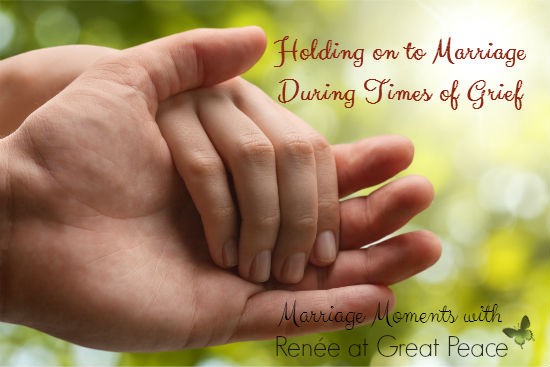
Holding on to Marriage During Times of Grief
Grief. At some point or another we all experience grief. It comes in many forms and various reasons. It will have an impact on marriage. The way the couple chooses to handle the grief will determine the outcome of the marriage and the overall path that the grief can take.
Grief comes because of some kind of physical separation. It can be due to a change in circumstances such as a job loss, a physical change in ones body, or even the loss of a personal dream or goal. Other times grief comes due to the death of a loved one. This could be through miscarriage, the death of a child, sibling, friend or the death of a parent.
Grief should not be confused with depression. While grief can lead to depression it is not in and of itself the same as depression. I believe that God has blessed us with hearts that love, and when we experience something that separates us from that love we feel an emotional breaking and grieve the loss. It is difficult, it hurts, it affects all of the person, body, mind and soul. While it may seem as if this grieving process is detrimental it is rather a process of healing.
My husband and I have experienced many times of grief in our marriage, from the loss of children as foster parents to job loss and most recently the death of my father, as well as other grief causing circumstances. What I’ve learned is that grief never looks the same. Each circumstance has led us through different methods of grieving. I’ve also learned that the way we each experienced our grief has been different from each other in each circumstance.
How Couples are Affected in Marriage during Times of Grief
Periods of mourning can be difficult on a marriage. Since the whole of a person is affected by the grief it can manifest itself in different ways. Because of the emotional response we each have to grief one may seem to lash out, accuse, belittle or even blame their spouse. Because of the physical response to grief one person may not be physically able to do as much as they were prior to the loss. They may not have any sexual desire or they may experience increased sexual desire. Because one’s spirit is mournful it may seem as if they have turned away from their husband or wife when they may simply be waiting for the other one to lift them up.

I would love to be able to tell you that we’ve figured it all out. That we understand how to manage our times of grief with love and compassion for one another and therefore if you do exactly as we do you will be just fine. Yet, that is not the case. We too, experience grief in ways that are detrimental to our marriage. We have to work at forgiveness and understanding. We have to trust our knowledge of our love for each other even in the most difficult of times because we don’t always reflect the attitude that we want to show. We often let our sorrow get in the way of encouragement.
Because grief looks different to different people and also in different circumstances there is not a single answer for how to hold on to marriage during times of grief. But I’ve come to understand that there are some things that we can do consistently to place our marriage in highest regard.
5 Ways to Hold onto Marriage During Times of Grief
First let me say, I am not a psychiatrist, psychologist or marriage counselor. I am a wife of 23 years who has experienced many forms of grief. Currently, my Beloved and I are working through the grief of the death of my father.
Of all of the various times of grief we have experienced this, for me, has been the most physically draining. Other times have been more emotional in focus and still other times have been difficult for my spirit to endure. All of them have been times that my husband and I have had to WORK through together. None of them have been easy and each have taught us something different. I share these 5 ways with you because they are what I have learned to do during times of grief, and also times of trial/testing.

- Turn to God – God is the creator of our life, our emotions, our souls. He understands our grief, Isaiah 53:3. Turn to the Bible for encouragement, turn to prayer to talk with the Lord. Your comfort should come first from Him. Pray specifically about your marriage and ask for guidance to hold on to your marriage even during the difficult time.
- Communicate with your Spouse– Of course we want the romantic, knight in shining armor, or comforting wife image that we have in our head where he/she knows exactly what we need/want or feel and therefore swoops in to provide what we need in the exact moment that we need it. He/She can’t know what you are feeling without you telling them. If you need to be held, share that. If you are having a sad day let him/her know. If you are experiencing a physical manifestation of grief, let your spouse know so you can take time to rest.
- Be Forgiving – I wish I could say that hurtful things aren’t said or done during grieving times. But it isn’t so. Sometimes I say things in hurt, or in anger that is misdirected toward my husband. Yet, he forgives me, Colossians 3:13. Sometimes he says or does things that are hurtful to me, and I forgive him. It isn’t always easy but we bear with one another in love, Ephesians 4:1-3. You have to decide in times of non-grief, non-stress to trust the love you have for each other and that it can/will withstand any trial that may come. It is why we forgive, because our love for each other should be greater than the hurt.
- Purpose to Spend Time Together – Date nights, or quiet dinners with just your spouse can go a long way in helping you to communicate affectively. This serves two purposes, it shows that you want your relationship to be a priority, and gives you the time you need to share your feelings. Maybe, because of new circumstances it’s more difficult to fit in a date night, but you can feed the kids earlier and have a quiet adult dinner after the kids are in bed.
- Cry Together – It’s so easy to go to a quiet place and cry alone. It’s easy to let go and give in to our emotions when no one is around to see. There should be time and place for that. But it’s also important, equally so, Romans 12:15, to grieve in the presence of the one you love the most in this world, your spouse. It’s good to share in the hurt and sorrow, it’s comforting to hold each other and realize that you both understand the pain. It’s good to cling to one another for encouragement. Nothing, in my opinion, will help you through the grieving process more than knowing that you are not alone.
For me, during grief I tend to get busy. I try not to let myself linger on the sorrow and just move ahead. But, this time around I’m finding that I’m experiencing physical grief. I hurt. My muscles ache, there is tension, headache, nausea and pain. And I know, I need to take it easy on myself. I need to realize that grief isn’t over in a few days, weeks or even months. In fact, some grief, like this one, I’ll never get over.
I embarrass over the grief. I know I shouldn’t. I know it’s o.k. to experience mourning and sorrow. Yet, I feel that no one wants to actually see that happening. So I hold it close to me, and when it manifests in a way that is public. I get embarrassed.
Whatever the reason that you are sorrowing. Know that the emotions you are experiencing are normal. Know that there is no set pattern for how you will experience it. I’ve heard it said that grief is like a ball of yarn that is a tangled mess. Yes! that is so true. Because we don’t follow a set pattern and often revisit emotions and thoughts we had once left behind. It’s an ongoing process and it is entirely normal. You aren’t crazy. Although I often feel like I’m going crazy. You are grieving, there is a distinct difference.






